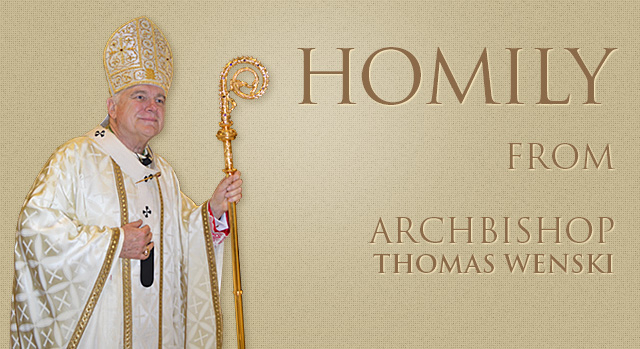By Archbishop Thomas Wenski - The Archdiocese of Miami
Homily by Archbishop Thomas Wenski at Sunday Mass at Little Flower Church in Hollywood, FL. Sunday, Feb. 5, 2017.
Today’s gospel reading is a continuation of Jesus’ Sermon of the Mount, the beginning of which we heard last Sunday. We find this Sermon in the fifth and six chapters of the gospel according to Matthew. And while we hear parts of this sermon in our gospel readings during Mass over the next few Sundays, I would encourage you to open your bibles and prayerfully read these two chapters of Matthew in one sitting � just to better appreciate its beauty, its impact and its challenge to each one of us. These teachings of Jesus on the Sermon of the Mount are as important to us Christians as are the teachings of Moses for the Jews when he came down from Mount Sinai with the Ten Commandments. Both Moses and Jesus “lay down the law” telling us what it means to be a member of God’s people.
Baptism has made us children of God and citizens of the Kingdom of God. If earthly kingdoms have their constitutions or “Magna Cartas” so too then does the Kingdom of God. We could say that the Sermon on the Mount is the constitution of those who aspire to be citizens of the Kingdom of God according to the New Covenant, the New Testament Jesus seals with his blood.
A nation’s constitution spells out the citizens’ rights and duties. For example, the American constitution tells us that we have right to life, liberty and the pursuit of happiness. But it also insists that we also as citizens have duties � the duty to pay taxes and, if called to, the duty to take up arms to defend our nation.
Likewise, in the Sermon on the Mount, Jesus as the new Moses, tells us that as citizens of God’s kingdom through baptism, we have also have rights: we have a right to the kingdom of heaven. As Jesus says, yours is the Kingdom of Heaven. We also have the right to be comforted, to have our thirst for righteousness satisfied, to receive mercy, to be called children of God. But rights do not come without duties. And thus to follow Jesus and to inherit the Kingdom, we must be peacemakers, we must be meek, we must thirst and hunger for justice, we must be clean of heart, and we must be ready to endure insult and persecution. These beatitudes � which we heard in last week’s gospel - are this constitution’s preamble. The beatitudes spell out if we wish to be happy, to be blessed the attitudes that must characterize our life in Christ. And in today’s gospel reading from that Sermon on the Mount Jesus tells us that we must be “salt of the earth” and “light of the world”.
These words are God’s words calling us to live in concern for others. Being salt and light for others is part and parcel of being a disciple of Christ, of being a Christian. How are we supposed to do this? The prophet Isaiah in today’s first reading pretty much spells it out: share your bread with the hungry, shelter the oppressed and the homeless, and clothe the naked. “If you remove from your midst oppression, false accusation and malicious speech; if you bestow your bread on the hungry and satisfy the afflicted, if you do justice� then shall you be justified. Then shall your light break forth like the dawn and the glory of the Lord shall shine about you.”
That word, “justified” or “justification” often goes right over our heads. It means simply being in a right relationship. We’re “justified” when we are in “a right relationship with God”; but Christianity is not only about “getting right with God” but also about “getting right with other people”. If we are to be “salt” and “light” the practice of our religion must include both God and our neighbor. We are after all is said and done our brother’s keepers.
Today, more than ever our world needs the “salt and light” of our witness. If you turn on your cable news shows � and they do call them shows, don’t they? � If you turn them on you find a lot of heat but not too much light. The “bitter zeal” that seems to be so characteristic of what passes for public debate today might be the way of the world � but it cannot be the way of the Church for it is beneath the standards of Christian witness. These days are days of angst for many people � on all sides of aisle. As Catholics and as Christians, I think it is important for us to remain “principled” but not partisan. That means when we can agree, we agree; and when we don’t, we say so without fear. But we can agree to disagree without being disagreeable. The way of the world is the way of the world. But for us as followers of Christ, there is a more excellent way, the Way of Love. Love, as St. Paul says, “�is not jealous, is not prone to anger, (and) does not rejoice in injustice�”
The world tells us that is good to be important � and so people seek to make their lives meaningful and happy by running after pleasure, power and plunder. Jesus is telling us in his Sermon on the Mount that it is more important to be good. It is not the “beautiful people” that will be blessed or happy but rather those people whom the world might consider as “nobodies” and insignificant or even as “losers” because they embrace the cost of discipleship and struggle to love and live the truth of the gospel.

